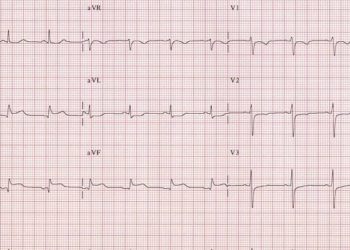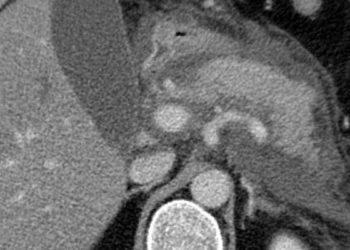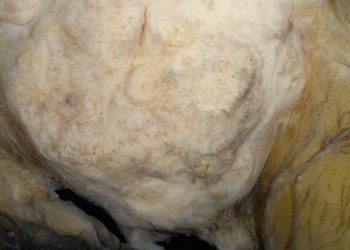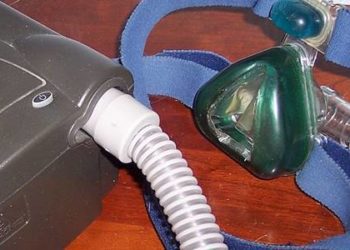2 Minute Medicine Rewind June 23 –29, 2014
In this section, we highlight the key high-impact studies, updates, and analyses published in medicine during the past week.
Atrial Fibrillation in Patients with Cryptogenic Stroke
Patients experiencing a stroke or transient ischemic attack (TIA) often undergo diagnostic workup involving 24 hour ECG monitoring for atrial fibrillation. However, it is suspected that this monitoring may be insufficient and that atrial fibrillation may be underdiagnosed and therefore undertreated in patients at risk for recurrent stroke. In this randomized control trial, 572 patients with recent history of an ischemic stroke or TIA of unknown cause (cryptogenic stroke/TIA) were randomized to receive either a 30-day event-triggered recorder or standard 24 hour monitoring. Researchers found that 16.1% of the intervention group compared to 3.2% of the control group had a detected atrial fibrillation episode of greater than 30 seconds (absolute difference 12.9%, 95% CI 8.0 – 17.6, p < 0.001). Similarly, 9.9% of the intervention group versus 2.5% of the control group had an atrial fibrillation episode lasting longer than 2.5 minutes (absolute difference 7.4%, 95% CI 3.4 – 11.3, p < 0.001). This resulted in more oral anticoagulant therapy prescribed in the intervention group compared to the control group (18.6% vs. 11.1%, absolute difference 7.5%, 95% CI 1.6 – 13.3, p = 0.01). This study shows that in patients with recent cryptogenic stroke or TIA, using 30 day ECG monitoring instead of 24 hour monitoring significantly improved the detection and treatment of atrial fibrillation.
Breast Cancer Screening Using Tomosynthesis in Combination With Digital Mammography
Tomosynthesis, a method of high resolution imaging, can now be used in combination with standard mammography and has been shown in single-institution studies to decrease the rate of false positives and increase the sensitivity of screening. In this larger, multicenter retrospective study, 281187 screenings with mammography alone from the period before tamosynthesis implementation were compared with 173663 screenings with mammography + tomosynthesis after implementation. Researchers found that the model-adjusted rates per 1000 screens for mammography alone versus mammography + tomosynthesis were as follows: recall rate for additional imaging, 107 vs. 91 (difference -16, 95% CI 16.6 – 22.1, p < 0.001), rate of biopsy, 18.1 vs. 19.3 (difference 1.3, 95% CI 0.4-2.1, p = 0.004), rate of cancer detection, 4.2 vs. 5.4 (difference 1.2, 95% CI 0.8 – 1.6, p < 0.001), rate of invasive cancer detection, 2.9 vs. 4.1 (difference 1.2, 95% CI 0.8-1.6, p < 0.001). These results demonstrate that the addition of tomosynthesis to digital mammography decreases recall rates and increases cancer detection.
Systemic sclerosis is a widely prevalent autoimmune disease that causes vasculopathy, inflammation, and fibrosis of the skin and internal organs. Autologous hematopoietic stem cell transplantation (HSCT) has been previously shown to be a viable treatment but is not well studied. In this randomized control study, the Autologous Stem Cell Transplantation International Scleroderma (ASTIS) trial, 156 patients with diffuse cutaneous systemic sclerosis where assigned to receive either HSCT or intravenous pulse cyclophosphamide. The primary end point was event-free survival with an event being death or persistent major organ failure. The trial found that after the first year, 16.5% of individuals in the HSCT group had an event compared with 10.4% of the control group. By 4 years, however, 19% of the HSCT group had had an event compared to 26% in the control group. Time-varying hazard ratios for event-free survival were 0.35 (95% CI 0.16 – 0.74) at 2 years and 0.34 (95% CI 0.16 – 0.74) after 4 years. This study shows that in patients with diffuse cutaneous systemic sclerosis, HSCT resulted in increased mortality after the first year of treatment but had a significant benefit in preventing death and organ failure over the long term.
Asperger’s syndrome is known to be associated with depression, but the degree and impacts of this depression are less well understood. In this UK cohort study, 374 adults diagnosed with Asperger’s were asked to complete a self-report recording their lifetime experiences of depression, suicidal ideation, as well as suicidal plans and attempts. This study found that 66.5% of the respondents reported suicidal ideation, 35% had plans or attempts at suicide and 31% reported having depression. The risk of suicidal ideation was significantly higher in Asperger patients than for individuals from the general UK population (OR 9.6, 95% CI 7.6-11.9, p < 0.0001), patients with one or more medical illnesses (p < 0.0001), and patients with psychotic illness (p = 0.019). These findings demonstrate that patients with Asperger’s are at high risk for severe depression and suicidality.
Rates of ST-segment elevation myocardial infarction (STEMI) are suspected to be rising in China, however there have been no nationally representative studies to characterize the prevalence, management, or outcomes of STEMIs. In this retrospective analysis, researchers sampled admissions from 175 hospitals involving 12,264 patients. Researchers found that the rate of STEM per 100,000 hospital admissions increased from 3.7 in 2001 to 8.1 in 2006 to 15.8 in 2011 (Ptrend< 0.001). There was a significant increase in use of aspirin within 24 hrs (79.3%, 95% CI 77.3-81.3 in 2001 vs. 91.2%, 90.5- 91.9 in 2011, Ptrend<0·0001), clopidogrel (1.5%, 0.9-2.1 in 2001 vs. 80.7%, 79.8-81.6 in 2011, Ptrend<0·0001), and primary percutaneous coronary intervention (10.2%, 8.1-12.3 in 2001 vs. 27.6%, 26.1-29.1 in 2011, Ptrend<0·0001). However while median length of hospital stay decreased from 13 days to 11 days, the adjusted in-hospital mortality did not significantly change from 2001 to 2011 (odds ratio 0.84, 95% CI 0.62 – 1.12, Ptrend = 0.06). This study highlights the growing incidence of cardiovascular disease in China and alludes to possible gaps in care that have resulted in unchanged outcomes despite improved uses of standard treatments.
Image: PD
©2012-2014 2minutemedicine.com. All rights reserved. No works may be reproduced without written consent from 2minutemedicine.com. Disclaimer: We present factual information directly from peer reviewed medical journals. No post should be construed as medical advice and is not intended as such by the authors or by 2minutemedicine.com. PLEASE SEE A HEALTHCARE PROVIDER IN YOUR AREA IF YOU SEEK MEDICAL ADVICE OF ANY SORT.









